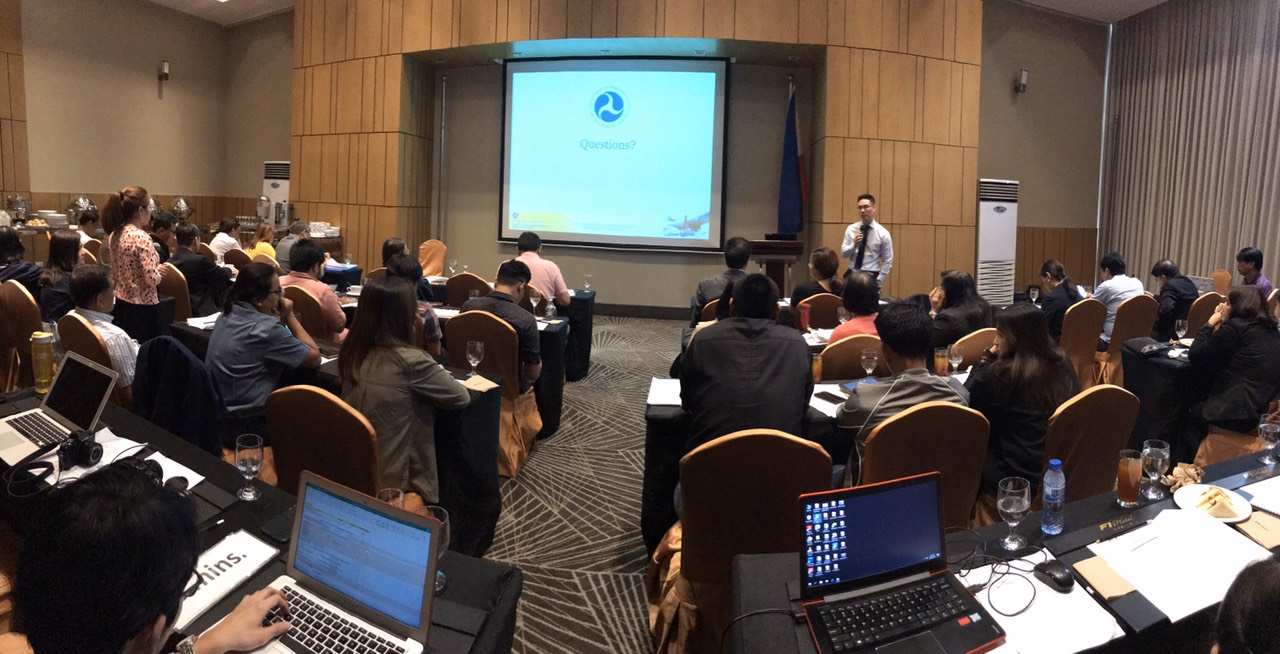
LNG SAFETY: Senior LNG Engineer of the U.S. Department of Transportation Thach D. Nguyen answering questions posed by training participants during the roundtable discussion on Developing a Regulatory Coordination Strategy for Multi Agency Rule Making.
TAGUIG CITY- The Department of Energy-Oil Industry Management Bureau (DOE-OIMB) and the Gas Policy Development Project (GPDP) organized the Technical Training on Liquefied Natural Gas- Health, Safety, Security, and Environmental (LNG-HSSE) Management, which was held from 5 to 6 September 2019 at the F1 Hotel Manila in Bonifacio Global City. The training is part of a series of capacity development activities conducted under the GPDP to strengthen DOE and partner agencies and local government units in facilitating LNG businesses in the country.
Energy Secretary Alfonso G. Cusi said, “As we intensify our efforts in transforming the country into a regional LNG hub, it is highly important that we are knowledgeable in the full implementation of LNG safety and security standards. We thank the GPDP family for their unrelenting support, especially since technical trainings like these would help us gain knowledge and develop the hard skills necessary to successfully meet key performance indicators related to the LNG industry."
Senior LNG Engineer Thach D. Nguyen and Senior Attorney Advisor Melanie A. Stevens from the U.S. Department of Transportation discussed the overview of federal safety standards for LNG, incorporation of industry standards into government regulation, performance based regulation, and inspection and enforcement of LNG. On the other hand, Business Development Director of Globeleq, Atty. John Smelcer, shared the best practices from South Africa and other new LNG markets on the planning process for establishing a new LNG import market. Atty. Mohamed Baddisy of the Commercial Law Development Program of the U.S. Department of Commerce also provided guidance based on his experiences on policy-related aspects of LNG in Africa and other countries.
Supervising Assistant Secretary for OIMB, Atty. Leonido J. Pulido III, in his closing remarks emphasized that natural gas is already a transition fuel, thus is not the “fuel of the future” as others have frequently regarded it. In fact, natural gas currently shares 28% of the total energy mix and 26% in the power generation mix. Nonetheless, Assec. Pulido emphasized the vital need to preserve the LNG space in the present energy mix. Underscoring the arduous task ahead saying, “Being a pioneer is usually difficult. When we issued the Circular, we know that we will need to work and learn more to effectively implement it. As such, having trainings like this that provide a venue to learn the technical aspects of LNG helps a lot in that process.”
Assec. Pulido also thanked the OIMB Team, the GPDP staff, the speakers and the HSSE IMT and challenged them to harmonize and streamline the requirements and processes to promote LNG as an investment-friendly business.
Also present during the event were DOE-OIMB Director Rino E. Abad, DOE-OIMB Assistant Director Rodela I. Romero, as well as representatives from the academe and other government agencies such as the Philippine National Oil Corporation, Department of Labor and Employment—Bureau of Working Conditions, Department of Interior and Local Government—Bureau of Fire Protection, Philippine Coast Guard, Maritime Industry Authority, Batangas City Engineers Office, Batangas City Office, and the UP National Engineering Center.
###
